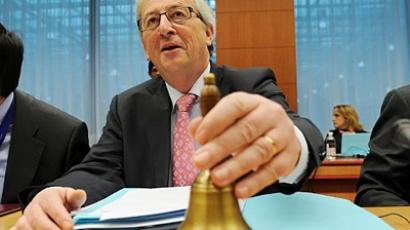Greek finance minister says EU bailout disputes solved
Greece has clarified all issues surrounding the country's austerity program for this year, Finance Minister Evangelos Venizelos says. But some sources claim EU finance chiefs still plan to delay a second bailout for the crisis-stricken country.
“We clarified all issues for reaching our 2012 fiscal goal,” Venizelos told reporters after a teleconference between Greece and seventeen eurozone finance chiefs on Wednesday.“The large, 325 million-euro sum has been finalized, so we are okay on this aspect.”Eurogroup chief Jean-Claude Juncker confirmed that Greece has made progress in convincing the finance ministers it should get the extra help – to the tune of a 130 billion-euro (170 billion US dollars) bailout – that it hopes will help it avoid default. However, Juncker added, Greece's implementation of the promised austerity measures will need tight supervision. Athens faces these demands while simultaneously lobbying for European approval of a separate debt relief deal with private creditors that must be agreed upon by March 20, and will need several weeks to kick in.Earlier, Juncker had cancelled a meeting on extra Greek rescue loans, settling for a teleconference instead. He said the decision was based on the realization that “further technical work” was needed “in a number of areas" related to the Eurogroup’s demands of the Greek government – in particular, tougher guarantees that Greece will use the money properly.In addition, eurozone finance chiefs received written commitments from the leaders of the two dominant Greek political parties that they will carry out the promised cuts and reforms after April elections, one of the key Eurogroup demands. According to Venizelos the written commitments, a new austerity bill passed in Parliament this week, and deeply unpopular but necessary labor reform legislation constitute a guarantee that Greece is going to keep its promises.But amid Greek optimism, Reuters cited several EU sources who claimed earlier that eurozone finance ministers were not content with Greece’s promises. They were reportedly considering delaying parts or even the entire new bailout until as late as April, after the country’s election. Athens must now make cuts to the country’s minimum wage and further layoffs in the public sector. To get the second rescue package Greece has allegedly agreed to cut defence spending, which has been the country’s sacred cow for decades. Reportedly, the military budget cuts start at €125 million and might go up.Since the Turkish invasion of Cyprus in 1974, Athens has been wary of another clash with Ankara. Greece has bought arms from many countries, including Russia’s long range S-300 surface-to-air missile system. The austerity measure may now mean the shelving of plans to buy Eurofighter aircraft, French frigates and German subs.The measures have been met with explosive protests and the some of the worst violence the Greek capital has seen in years. A 100,000-strong demonstration hit the streets of Athens while parliament was still voting, with some 2,000 anarchist protesters causing a violent and destructive riot.It is also not clear whether Greece’s debt-to-GDP ratio will be cut to 120 per cent by 2020 via the agreement, as demanded by the ‘troika’ of the European Commission, IMF and European Central Bank. Greek debt is now roughly 160 per cent of GDP.















